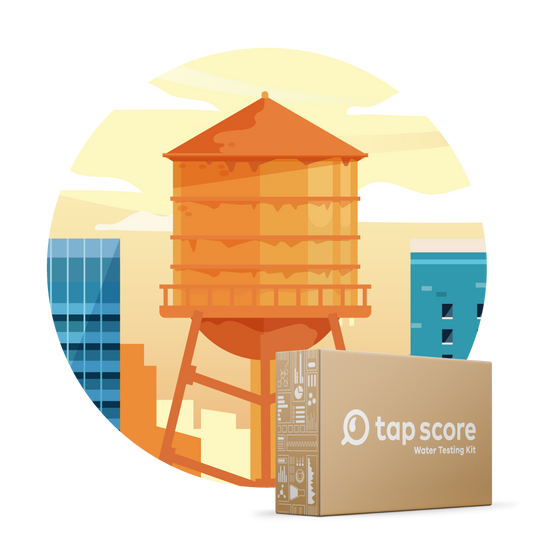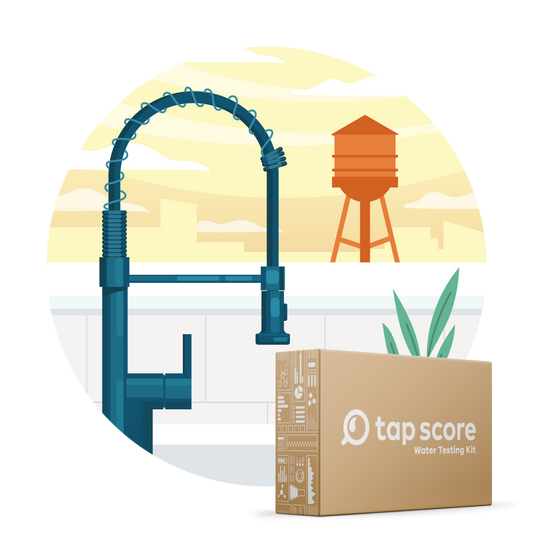
Is It Safe to Drink Your Water After a Hurricane?
Our blog is written by real experts— not AI. Each guide is carefully reviewed and updated based on the latest research. Plus, with no affiliate links, you can count on unbiased insights you can trust.
Hurricanes, and the flooding that they cause, can make both private well and municipal tap water unsafe to drink. This short guide on water quality after a hurricane addresses how hurricane flooding can disrupt a city’s water supplies by overwhelming water treatment facilities, how it can contaminate the groundwater supplies private wells rely on, and what you can do to stay safe.
Table of Contents:
- How Do Hurricanes Affect Drinking Water Quality?
- Is Tap Water Safe After a Hurricane?
- When Should I Test My Water After a Hurricane?
- Protecting Your Water Supply During Hurricane Season
- What’s the Takeaway?
How Do Hurricanes Affect Drinking Water Quality?
Hurricanes cause flooding which can disrupt a city’s water supplies by overwhelming water treatment facilities. They also cause widespread damage to vital water infrastructure networks from the gale force winds that can level urban landscapes and hurl all sorts of debris across the landscape.
-
Flooding: As water moves across the built environment, it can pick up all sorts of bacteria from sewage or animal waste, heavy metals, VOCs, and nitrates from agricultural and industrial waste, and a slew of other chemicals (e.g. petro-chemical products, etc.), all of which are toxic to humans if ingested.
Flooding is also a serious threat to natural surface water sources like rivers, streams, lakes, and reservoirs. Floods can carry nutrients, which can cause algal blooms, and other pollutants that can overwhelm water treatment facilities.
-
Damage: Hurricane flooding and gale force winds carry debris that can destroy piping networks, water treatment plants, and private wells.
Is Tap Water Safe After a Hurricane?
If a hurricane caused flooding or visible damage in your area, consider all water unsafe until it is explicitly deemed otherwise by local authorities.
We’ve done a deeper dive on the hidden danger of floods to water quality, but it’s key to note that the major risk with floodwater is its potential to harbor bacteria from damaged sewage infrastructure (including cesspools, septic tanks, and waste lagoons) that might infect people with potentially life-threatening infectious diseases.
Pathogenic microorganisms that may be lurking in floodwaters include:
- E. coli
- Salmonella
- Hepatitis A virus
- Tetanus bacteria
- Leptospira
For hurricanes, which barrel in with an influx of ocean water, diseases caused by Vibrio bacteria can be a risk.
The Center for Disease Control (CDC) advises that if you are in a flooded area, in addition to not ingesting any contaminated water, you should avoid or limit direct skin contact with it altogether.
Public Water Systems
Municipal or city water supplies are obligated to maintain communication with customers throughout any disaster scenario. That means if you get your water from a public water utility, impacted systems will issue advisories (known as a “Boil Water Advisory”) to its customers as the situation develops.
As we mentioned earlier, consider your water unsafe to drink until informed otherwise. Floods can impact small water systems the hardest due to having fewer staff overall. These small teams work under incredibly difficult circumstances to get water treatment running and operational after a major disaster.
Private Well Owners
Because wells are not monitored by any governmental agencies, those with private wells are at highest risk. Flood debris can dislodge well hardware, allowing contaminated water and sediment to enter your well system. Total collapse of your well is a possibility, particularly the closer you are to where the storm makes landfall.
If you lost power during the storm but there was no significant flooding in your area or damage to your private well or septic system, well contamination chances are low.[2] However, you should flush the well to pump stagnant water out of your system before use. Open every outdoor and indoor tap and let the water run for at least 15 minutes before use.
Testing your water before resuming use is highly recommended, even for city water customers.
When Should I Test My Water After a Hurricane?
Because hurricanes impact water systems immediately, you should test your water after the hurricane flooding subsides. For those on city water or public water systems, this may depend on whether or not you have running water. For those with private wells, you should test your water once your system is operational.
Testing your water will inform your household whether or not the water is safe, perhaps sooner than you’d find out otherwise. As a precaution, do not ingest any tap water which has not been treated (or tested) first.
Public Water Systems
If your water comes from a city or public water system, your water treatment plant will be working to identify and treat contaminants as soon as possible. Testing your city water may still be the best course of action given that:
- Your home’s piping system may impact water quality
- Water treatment plants control contaminants that are regulated, meaning an array of other unregulated contaminants may have been entering the water system due to impacts of the storm
Private Well Owners
If your water comes from a private well, testing your well water to check for contaminants is particularly important, as any contaminants in the floodwater are likely to get into your well water. Knowing your water quality is your responsibility, especially in isolated areas.
We always advocate testing before treating so you can determine the best course of action for your water quality. This is particularly important after a hurricane because the storm may have introduced contaminants that were not a part of your water source before the storm.
Protecting Your Water Supply During Hurricane Season
There are a number of ways to protect yourself before and after a hurricane.
Before
The FDA has prepared the following guide for preparation and supplies. A well-stocked emergency kit should have at least a 3-day supply of water per person (1 gallon per person, per day) (plus pets).
(The EPA has also prepared an in-depth guide to Disaster Debris Planning)
After
The CDC recommends that you bring water to a rolling boil for at least one minute in order to kill major waterborne pathogens before using potentially-contaminated tap water.
Note: Boiling water also has the unintended consequence of concentrating certain contaminants that might be in your water, like heavy metals (including lead).
Alternately, water may be treated with household chlorine beach (4-6% active ingredients) by mixing eight drops (1/8 teaspoon; about the size of a dime) per gallon of water. Mix the solution thoroughly, and let stand for approximately 30 minutes.
Note: Although chlorine bleach is effective against microorganisms, it will not remove chemical contamination (including heavy metals). Also, be sure to get unscented bleach that is free of other additives; household bleach often includes scents and other ingredients that you don’t want to add to your water.
Tips to Keep in Mind:
- Being aware of the types of contaminants that could be present in your water after a hurricane event (e.g., if you live near industrial plants, farmlands, wastewater treatment facilities) can inform your home treatment choices and any immediate actions to take for obtaining safe water.
- Early symptoms of illness from drinking water contaminated with bacteria can include stomach and intestinal problems and headaches — symptoms that look a lot like the flu.
- The best way to make sure you’re treating your water properly is to first identify what’s in it.

What’s the Takeaway?
- Hurricanes may cause widespread damage to vital water infrastructure networks from flooding and debris that can destroy piping networks, water treatment plants, and private wells
- If a hurricane caused flooding or extensive damage in your area, consider all water unsafe until it is explicitly deemed otherwise by local authorities.
- You should test your water as soon as you have running water, particularly as a private well owner. Although city water customers will receive notices from their utilities, testing is still recommended.
- Boiling tap water for at least one minute will kill major waterborne pathogens, but it will also concentrate any heavy metals (and various other contaminants) present. Alternately, tap water may be treated with household chlorine beach, though it will not remove any chemical contaminants (including heavy metals).
Articles on other scenarios:
How Wildfires Impact Your Drinking Water Quality
How Does Agriculture Pollute Private Wells?
Media inquiries? Get in touch with our team of water quality experts!
Read More
▾Sources and References
▾- Hurricanes | US EPA
- Hurricane Recovery: Well Water Safety After a Hurricane - News
- Ready.gov Hurricane Preparedness Plan
- Emergency Response for Drinking Water and Wastewater Utilities | US EPA
- Hurricane Season: Be Prepared | FDA
- Making Water Safe in an Emergency | Water, Sanitation, & Hygiene-related Emergencies & and Outbreaks | Healthy Water | CDC






